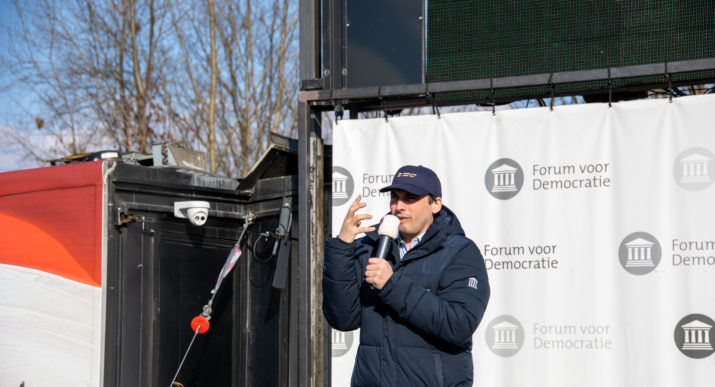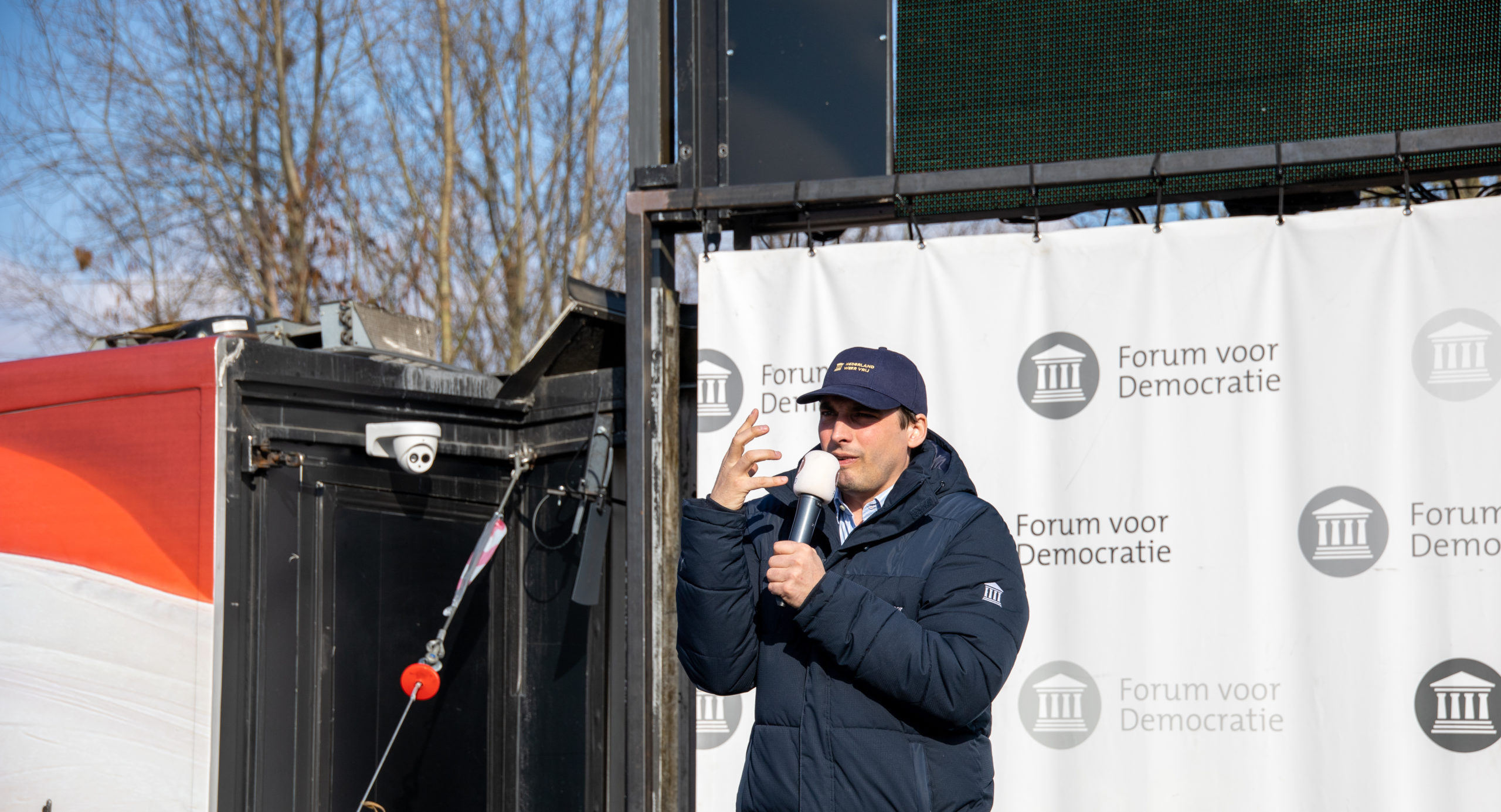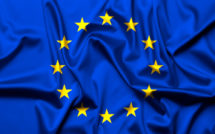
Rewriting the Netherlands’ Past and Future: Thierry Baudet’s Use of Holocaust Analogies during the COVID-19 Pandemic

This is part of our special series on the Novel Coronavirus (COVID-19) pandemic.
On December 15, 2021, the Amsterdam District Court ruled that Dutch far-right Forum for Democracy (FvD) party leader Thierry Baudet must remove his social media posts comparing the Holocaust to the government’s COVID-19 policies, or face a fine of €25,000 for every day that they remain online. Additionally, Baudet was prohibited from repeating the content of those posts and using images of the Holocaust to make future arguments about its similarity to COVID-19 measures. The Center for Information and Documentation Israel (CIDI), a nonprofit foundation reporting on issues related to Israel and to antisemitism in the Netherlands, the Central Jewish Council (CJO), an umbrella organization for Jewish interest groups, and four Holocaust survivors filed summary proceedings against Baudet citing Article 8 of the European Convention on Human Rights (ECHR). Under Article 8, which states: “Everyone has the right to respect for his private and family life, his home and his correspondence,” the aforementioned groups made a case that their, “personal integrity and human dignity” were violated by his online statements.[1] To counter their injunction, Baudet argued that the removal of the social media posts infringed on his “right to freedom of expression” covered by Article 10 of the ECHR.[2]
Baudet’s use of Holocaust analogies comes at a transitional moment in Dutch Holocaust memory debates. On January 27, 2020, which marked International Holocaust Remembrance Day, Prime Minister Mark Rutte apologized for the government’s failure to protect the Jewish population during the Holocaust. Rutte’s apology was the first time in seventy-five years that the government officially acknowledged the scope of Dutch collaboration during the country’s five-year occupation by the Nazis, during which time 75 percent of the country’s Jewish population was deported.[3] His January speech was followed by King Willem-Alexander’s May 4th Remembrance Day address, in which he formally apologized for the Dutch crown’s inaction during the Holocaust.
This article places Baudet’s statements within the context of shifting state narratives of the Second World War and Nazi occupation. As a member of a broader radical far-right movement, Baudet and by extension the FvD, challenge the increased state attention on the Holocaust and Jewish victimhood because antisemitic conspiratorial thinking is foundational to the party. The COVID-19 pandemic served as a crisis that Baudet could easily exploit in service of his continued fearmongering over the threat of supranational institutions and the influx of non-white and non-Christian immigrants and refugees. His use of Holocaust analogies and antisemitic speech not only pushed back against Jewish victimhood, but it also allowed Baudet to present himself and the FvD as victims of a Jewish plot to destroy white Dutch “civilization.” Portraying government COVID-19 mandates as major infringements on individual freedom and rights, Baudet labeled the Dutch government as fascist, while simultaneously engaging in fascist tactics himself. More than drawing on popular memory of a five-year Nazi occupation or playing to his base, his commentary was a veiled threat directed towards Dutch Jews and to a lesser degree, Prime Minister Mark Rutte’s government and the European Union (EU). The increasing association between Holocaust memorialization and “European values” and the adoption and support of Holocaust education programs by the EU provided an additional motivation for Eurosceptics and right-wing politicians such as Baudet to decry the imposition of top-down policies that force remembrance and decenter the narrative of national suffering under the Nazi occupation. By using the language of the Second World War and the Holocaust to denounce COVID-19 policies, something Baudet has done from the very beginning of pandemic, he played on ideas of victimhood and countered the recent acknowledgement of Dutch government collaboration during the Holocaust.
Forum for Democracy, Antisemitism, and the Coronavirus
Thierry Baudet began FvD as a conservative think-tank in the aftermath of the Dutch parliament’s decision not to pursue a referendum on the Netherlands’ membership in the EU. In 2016, FvD and right-wing website GeenStijl campaigned and won a referendum to prevent a trade association between the EU and Ukraine. Although 61.1 percent voted against the deal, with only 32.2 percent showing up to the polls, the Dutch senate nevertheless ratified the trade agreement the next year. This served as the impetus to transition the think-tank into a fully-fledged political party. In their first election, FvD, chaired by Baudet, won two seats in the House of Representatives. Merijn Oudenampsen, whose latest book charts the evolution of the new far-right in Dutch politics describes FvD’s platform as a, “New Right fusionist agenda, combining a free market platform of lowering taxes, cutting welfare and flexibilizing the labor market with a conservative cultural agenda focused on limiting immigration, defending ‘Western Civilization,’ reclaiming national sovereignty and countering feminism and environmentalism.”[4] Baudet’s reference to the destruction of “boreal” Europe on FvD’s first election night, a dog whistle for “Aryan” also used by Jean-Marie Le Pen, demonstrated his dedication to white supremacy, and the ease with which he used fascist rhetoric.[5] By evoking the imagery of a “struggle” or “battle” against multiculturalism and Muslim immigration, and harkening back to a mythic racially homogenous past, Baudet signaled his loyalty to a transnational far-right movement.[6]
Baudet’s educational background (PhD in Law at Leiden University), and his intentional and self-styled image as a respectable “cultured” intellectual has resulted in several comparisons by journalists and political pundits with the other far-right figure in Dutch politics, Geert Wilders. In contrast to the Party for Freedom (PVV), in which Wilders is the sole member, FvD’s electorate tends to be more educated, younger, and middle-class. Warning of the threat FvD posed, professor of Law at Leiden Law School Maartje van der Woude, wrote in 2019: “FvD is successfully diversifying the radical right by presenting itself as a voice of good sense, while delivering apocalyptic messages about the loss of Dutch national identity and the dangers of Europeanization.”[7] Presenting himself and the FvD as an alternative to Wilders’ PVV and his explicitly Islamophobic statements, Baudet’s “façade of competence and erudition,” abruptly came to a halt with a slew of scandals which erupted in 2020 and 2021.[8]
Two days after Baudet temporarily stepped down as Party leader in response to accusations of antisemitism within FvD’s youth wing, FvD senator Nicki Pouw-Verweij wrote a letter to board members, which was then published in NOS, raising the alarm about Baudet’s “radicalization” and engagement with conspiracy theories.[9] In the letter, Pouw-Verweij explained that during a dinner for the top ten candidate list for FvD, Baudet, “shouted that Corona was brought into the world by George Soros and others…to take away our freedom and start a new world domination.”[10] When she spoke out against tolerating antisemitism or Nazism, Baudet said: “Where does your crusade against antisemitism come from? Almost everyone I know is an antisemite.”[11] The schism within FvD and Baudet’s reelection as party leader ultimately led to Annabel Nanninga and Joost Eerdmans creating their own political party, JA21, and taking several MEPs, senators, and representatives, such as Pouw-Verwijl with them. FvD currently has five seats in the House of Representatives and now only a single senator after two senators resigned from the party over Baudet’s support of Putin. Despite this, the FvD remains a visible force in Dutch politics, partly due to the media’s nonstop coverage of his intentionally controversial statements.
At the outset of the pandemic, Baudet and Wilders both called for a lockdown and lambasted Rutte and the National Institute for Heath and Environment (RIVM) for their inaction. But several months later, Baudet reversed his stance on the pandemic and became one of the top sources of COVID-19 conspiracy theories. In addition to blaming George Soros, a tactic regularly used by Europe’s far-right parties during moments of either real or fabricated crisis— Baudet has been peddling the “Great Reset” conspiracy, which “claims a global elite is using the coronavirus pandemic to dismantle capitalism and enforce radical social change.”[12] The threat of a global Jewish elite controlling financial markets and national governments and seeking to destroy the “West” has been at the core of antisemitic thought since the nineteenth century. As Jovan Byford has argued, “For those affiliated with the far-right, Jews represent an omnipotent force with almost supernatural powers, intent on the destruction of independent nations and the creation of a secular, Jewish-controlled, New World Order.”[13] Soros has become the imagined figurehead of this Jewish conspiracy, but as Jelena Subotic has argued: “he is but a today’s version of the antisemitic target onto whom the nation’s ills are projected…This is how transnational antisemitism operates-it fixates on Jews as agents of disturbance of the nation…”[14] The COVID-19 pandemic offered far-right parties, such as the FvD an opportunity to infuse critiques of government health policy with more extremist ideas foundational to their party platform. It also created an opening for the radicalization of those who had not previously seriously engaged with far-right ideology.[15]
The Coronavirus and Holocaust Commemoration
The four posts under review by the Amsterdam District Court represented only a fraction of what either Baudet or FvD have posted about the Coronavirus and the Second World War or Holocaust. For example, in May 2021, FvD replicated the posters used by the National Committee for 4 and 5 May in their advertising campaign for the May 5th Liberation Day commemoration, which celebrates the country’s liberation from Nazi occupiers, but changed the wording to read: “On May 5th, we commemorate 75 Years of Freedom, 1945–2020.” The end date of 2020 represented the beginning of the pandemic and the introduction of government measures aimed at curbing the spread of the virus. Beyond the intentional stylistic similarities between FvD and the National Committee’s poster, FvD’s statement played on the idea of the Netherlands’ freedom from Nazi occupation to make an argument about the nature of Coronavirus policies. By linking the occupation and the current Dutch government’s mandates, FvD characterized the government as fascist, without explicitly saying so. The backlash to the poster erupted almost immediately, with politicians and commentators denouncing the FvD’s narrative. Baudet responded immediately to the criticism by tweeting:
For decades, our opponents have politicized the War to push mass immigration, Europe power fantasies and modern art. Now we say: shall we also on May 5th reflect on the freedoms we lost in 2020/2021? That shouldn’t be allowed? What hypocrisy.[16]
In addressing the so-called hypocrisy of critics, Baudet restated those ideas underpinning the FvD party platform. Connecting immigration, the EU, and modern art to the Second World War translated into a larger far-right narrative of a cosmopolitan Europe that threaten not only the sovereignty of nation-states such as the Netherlands but its very culture and demographic composition. His tweet also doubled down on the comparability of the Nazi occupation and COVID-19 measures by offering up May 5th as a day to “reflect” on the loss of freedom, a date which, unlike the May 4thRemembrance Day commemoration, is synonymous with celebrations of the country’s liberation.
Baudet, who has successfully harnessed the power of social media to spread his conspiracy theories and comment directly in videos or tweets on events in Dutch politics, once again used his platform to delegitimize the criticism made by Jewish organizations. In response to an NOS tweet on a letter denouncing the use of Holocaust symbols during protests against government Coronavirus policies, Baudet tweeted:
Dear Jewish organizations, 1) The War is not yours but all of ours. 2) No one is comparing the ‘holocaust’ with the #apartheidpas, it’s about the 1930s 3) For 50 years the “left” has done nothing but invoke the War, 3) Look around you, what is happening NOW before our eyes![17]
His trivialization of the Holocaust directly connects to his adoption of the Dutch victimization narrative, a narrative which has existed since the end of the war. In the aftermath of the Holocaust, the Dutch government did not make a distinction between Jewish and non-Jewish returnees as to not replicate the same system of categorization enforced by the Nazi occupiers.[18] This meant that Jewish survivors faced a cold reception from Dutch officials and civilians upon their return. Without acknowledgment of the specific experiences of Jews during the Holocaust, the narrative of wholesale Dutch suffering remained pervasive in the decades after the war. Today, the pushback against the centering of Jewish experiences rears its ugly head during those moments in which either Jewish organizations argued for greater attention to the Holocaust or the state announces support for commemorative or educational initiatives. The capitalization of “war” and the lower-case spelling of the “Holocaust” reflected the value each event held for Baudet and his understanding of Dutch national identity. Even more shocking was the placement of Holocaust within quotation marks, which Schut and Voet argued “can only be interpreted as trivialization or even an outright denial of the Shoa.”[19] Baudet emphasized that his comparison of the COVID-19 measures was not with the Holocaust itself, but the 1930s, suggesting that laws targeting every aspect of German Jews’ lives are comparable to what Dutch civilians are facing. The reference to the COVID-19 vaccination pass as an “apartheid-pass” created yet another false analogy, but this time to the apartheid regime of South Africa. The racist implications of analogizing the requirement to show proof of vaccination at restaurants and shops to a regime which violently segregated South African society along racial lines was intentional, as Baudet once again recast himself and his followers as victims to the detriment of the actual victims of that regime. Additionally, Baudet’s use of quotes around the word left conflated leftist political parties with Jews.
Baudet’s involvement in a broader European far-right movement has influenced his talking points and shaped the FvD’s platform in the Netherlands. The far-right’s projection of its own perceived victimhood has gone even further in the phenomenon of referencing oneself or group as the “new Jews.” This rhetorical move mocks Jewish victimhood and sidesteps logical analyses of the far-right’s treatment in the political and social sphere. The posts under review by the Amsterdam district court represent Baudet’s intentional escalation of Holocaust analogies and showcase how much he borrowed from an established far-right script. The first tweet from November 14, 2021 read:
Deeply touched by @mauricedehond’s newsletter this morning. He is so right: the current situation can be compared to the 1930s and 1940s. The unvaccinated are the new Jews, the ignorant excluders are the new nazis and NSB-ers [Dutch National Socialists]. There, I said it.[20]
While in the past, Baudet had argued for the similarity in circumstances between Jews during the Holocaust and those protesting COVID-19 measures, in this Tweet Baudet explicitly labeled the unvaccinated “Jews” and supporters of the health measures “Nazis.” Again, he relied on a role-reversal of victim and perpetrator to drive home his point about government Coronavirus policies. While some may label his statements as intentionally hyperbolic for the purposes of gaining attention, especially from the media, his escalation proved that these comments also reflected his intention to challenge Holocaust memorial culture and Jewish victimhood. Writing on the use of “new Jews” trope by propagandists in Russia, Sophia Moskalenko and Mia Bloom argued, “Psychologically, by associating themselves with Jews, and specifically with genocide and the Holocaust by the Nazis, it allows Russians to cynically paint themselves as the real victims.”[21] Moreover, when used in political rhetotic, “martyrdom stories construct strong moral imperatives to protect the victim and punish the perpetrators.”[22] In using this tactic, Baudet claims victimhood and public sympathy, while also reducing Jews to the status of unworthy victims. By categorizing the unvaccinated as the “new Jews” and simultaneously blaming Jews for fabricating the pandemic, Baudet drew upon historical Dutch attitudes towards Jews to argue that they have wielded their supposed victimhood for the purposes of gaining political and social capital while simultaneously threatening white Christian Dutch society.
Two days later, Baudet posted images on Twitter and Instagram comparing the plight of Jewish children during the Holocaust to the pandemic’s impact on contemporary Dutch children. He used two present-day images (a young boy being toweled off after being in a pool and a boy in a Sinterklaas themed outfit looking through a fence) alongside a black and white photograph of a young boy wearing a Jewish star in the Łódź ghetto speaking to people through a fence, as evidence of a supposed link between the two periods. The post was accompanied by the caption:
Ask yourself: Is this the country you want to live in? In which children who are ‘unvaccinated’ are not allowed to go to the arrival of Sinterklaas? And need to be dried off outside after swimming lessons? If not: RESIST! Stop participating in the apartheid, this exclusion, this INSANITY.[23]
A Tweet posted ten days later, after the summons by the plaintiffs, continued this theme. Posting an article discussing the Covid-19 policies at the Buchenwald concentration camp, Baudet wrote:
Irony at its best! Former Buchenwald concentration camp now uses 2G [entry for those recovered from Coronavirus or fully vaccinated] at an exhibition about…excluding people. How is it POSSIBLE to still not see history repeating itself?![24]
Both posts emphasize “exclusion” as the theme connecting current government mandates and the Holocaust. While Baudet denies his statement is intended to compare the ultimate fate of the unvaccinated and Jews in the 1930s and 1940s, his comment that the “unvaccinated are the new Jews” suggested that the entirety of Jewish experience during the Holocaust is what unvaccinated will face unless the public followed the FvD’s lead and fought back against government measures. Baudet’s use of Holocaust analogies is not a mere tactic to bring attention to the perceived severity of government measures. He has argued at different moments that those who implement or adhere to COVID-19 public health policies are “Nazis” and has also blamed Jews for the pandemic as an attempt to radically reshape Dutch and European society. If we take this false logic to its ultimate conclusion, Baudet labeled Jews as “Nazis” and used the pandemic to undermine Holocaust memorial culture.
While the Amsterdam District Court did not find that Baudet engaged in “direct trivialization or minimization of the Holocaust,” which allowed him to use freedom of expression as a defense, they ultimately found that the comparisons he made were unnecessary within the scope of public debate over the government COVID-19 measures. In fact, the Court found that he “instrumentalized the human suffering of Jews” and his statements “contribute to a climate in which expressions of antisemitism are fueled.”[25] Antisemitic responses to the court’s ruling, documented by CIDI, further proved that Baudet’s Holocaust analogies have increased and normalized online expressions of antisemitism under the guise of active debate over government measures and now freedom of speech.[26] Baudet was well-aware of the impact his statements had on media coverage and embraced his role as a controversial figure. His Tweets prove that Baudet has made Holocaust distortion a hallmark of his agenda. Without explicitly denouncing PM Mark Rutte’s administration for acknowledging Dutch complicity or funding Holocaust museums and memorials, Baudet used antisemitic dog whistles to spread and normalize the critiques of Jewish victimhood. Moreover, he also appropriated Jewish victimhood to portray himself and his party as victims of a tyrannical regime. By reversing victim and perpetrator roles, Baudet successfully gained media attention and undermined Jewish experiences in the Netherlands and Europe more broadly. His continued use of Holocaust analogies in the months after the trial prove that he is unwilling to deviate from antisemitic conspiratorial thinking and his threats to Dutch Jews need to be taken seriously.
Jazmine Contreras is an assistant professor of history at Goucher College in Baltimore, Maryland, and her research focuses on contemporary controversies over memory of the Holocaust in the Netherlands.
References
[1] ECLI:NL:RBAMS:2021:7392 – Rechtbank Amsterdam, 15-12-2021 / C/13/710651 / KG ZA 21-989.
[2] Ibid.
[3] In 2000, Prime Minister Win Kok apologized for the “icy welcome” Jewish survivors received upon their return to the Netherlands, but no official and full apology has occurred before 2020. During the Holocaust, approximately 102,000 Jews were murdered by the Nazis.
[4] Merijn Oudenampsen, The Rise of the Dutch New Right: An Intellectual History of the Rightward Shift in Dutch Politics (New York: Routledge, 2021), 208.
[5] Marijn Kruk, “How Thierry Baudet aan de Lippen Hing van Jean-Marie Le Pen,” De Correspondent, February 18, 2018,https://decorrespondent.nl/7955/hoe-thierry-baudet-aan-de-lippen-hing-van-jean-marie-le-pen/811713530980-29774dcf (Accessed March 24, 2022). Kruk also makes the argument that Baudet believes in the rhetoric he espouses and it is not for show; In an interview on March 25, 2022, Dutch journalist Asha ten Broeke characterized Baudet as a fascist.
[6] Thijs Kleinpaste, “The New Face of the Dutch Far-Right,” Foreign Policy, March 28, 2018, https://foreignpolicy.com/2019/03/28/the-new-face-of-the-dutch-far-right-fvd-thierry-baudet-netherlands-pvv-geert-wilders/ (Accessed March 25, 2022).
[7] Maartje van der Woude, “From Islamophobia to Oikophobia in the Netherlands,” Social Justice Journal, May 23, 2019, http://www.socialjusticejournal.org/from-islamophobia-to-oikophobia-in-the-netherlands/ (Accessed March 10, 2022).
[8] Nicolaas Barr, “The New Dutch Far Right,” Jewish Currents, July 2, 2020, https://jewishcurrents.org/the-new-dutch-far-right (Accessed March 9, 2022)
[9] “Brief over Baudet Vol Ruzie en Complottheorieën,” NOS, November 25, 2020, https://nos.nl/artikel/2358110-brief-over-baudet-vol-ruzie-en-complottheorieen.
[10] “Brief over Baudet Vol Ruzie en Complottheorieën.”
[11] “Brief over Baudet Vol Ruzie en Complottheorieën.”
[12] Ciarán O’Connor, “The Spread of the ‘Great Reset’ Conspiracy in the Netherlands,” Digital Dispatches, February 23, 2021, https://www.isdglobal.org/digital_dispatches/the-spread-of-the-great-reset-conspiracy-in-the-netherlands/.
[13] Jovan Byford, “Conspiracy Theories,” Key Concepts in the Study of Antisemitism, eds. Sol Goldberg, Scott Ury, and Kalman Weiser (London: Routledge, 2021), 79.
[14] Jelena Subotic, “Antisemitism in the Global Populist international,” British Journal of Politics and International Relations, (December 2022), https://doi.org/10.1177/13691481211066970 (Accessed March 16, 2022).
[15] Blyth Crawford, “Coronavirus and Conspiracies: How the Far Right is Exploiting the Pandemic,” Society Stories, King College London, September 16, 2020, https://www.kcl.ac.uk/coronavirus-and-conspiracies-how-the-far-right-is-exploiting-the-pandemic (Accessed March 14, 2022).
[16] Thierry Baudet (@thierrybaudet), 2021. “Al decennia politiseren onze tegenstanders de Oorlog om massale immigratie, Europese machtsfantasieën en moderne kunst te pushen. Nu zeggen wij: zullen we op 5 mei ook even stilstaan bij de vrijheid die we in 2020/2021 zijn kwijtgeraakt? Dat zou niet mogen? Wat een hypocrisie. Twitter, May 3, 2021.
[17] The letter was cosigned by CIDI, CJO, the Netherlands Auschwitz Committee, the editor-in-chief of the Nieuw Israëlietisch Weekblad and the director of the Jewish Cultural Quarter, Emile Schrijver. Thierry Baudet (@thierrybaudet), 2021. “Beste Joose organisaties, 1) De Oorlog is niet van jullie maar van ons allemaal 2) Niemand vergeleek de ‘holocaust’ met de #apartheidpas, het ging om de Jaren ’30 3) Al 50 jaar doet ‘links’ niets anders dan de Oorlog aanroepen 3) Kijk om je heen, wat NU voor onze ogen gebeurt!” Twitter, September 19, 2021.
[18] Dienke Hondius, Return: Holocaust Survivors and Dutch Antisemitism (Westport: Praeger, 2003), 67.
[19] Bart Schut and Esther Voet, “Tegen Ziekmakende Vergelijkingen,” NIW, September 23, 2021, https://niw.nl/tegen-ziekmakende-vergelijkingen/(Accessed March 12, 2022).
[20] Thierry Baudet (@thierrybaudet), 2021. “Diep geraakt door de nieuwsbrief van @mauricedehond vanochtend. Hij heft zo gelijk: de situatie van nu is met de jaren ’30 en ’40 te vergelijken. De onvaccineerden zijn de nieuwe joden, de wegkijkende uitsluiters zijn de nieuwe nazi’s en NSB-ers. There, I said it.” Twitter, November 14, 2021.
[21] Sophia Moskalenko and Mia Bloom, “Ukraine War: Why Putin’s Propagandists Claim They’re the ‘New Jews,’” Haaretz, March 15, 2022, https://www.haaretz.com/world-news/.premium.HIGHLIGHT-ukraine-war-why-russian-propagandists-now-claim-they-re-the-new-jews-1.10675492(Accessed March 30, 2022).
[22] Moskalenko and Bloom, “Ukraine War: Why Putin’s Propagandists Claim They’re the ‘New Jews.’”
[23] Thierry Baudet (@thierrybaudet), Twitter. “Vraag jezelf af: is dit echt het land waarin je wilt leven? Waarin kinderen die “ongevaccineerd” zijn niet naar de intocht van Sinterklaas mogen? En buiten moeten worden afgedroogd na de zwemles? Zo nee: KOM DAN IN VERZET! Doe niet meer mee met deze apartheid, deze uitsluiting, deze WAANZIN!” Twitter, November 16, 2021.
[24] Thierry Baudet, (@thierrybaudet), Twitter. ““Ironie ten top! Oud-concentratiekamp Buchenwald hanteert nu 2G bij tentoonstelling over … het uitsluiten van mensen. Hoe is het MOGELIJK om nu nog altijd niet te zien hoe de geschiedenis zich herhaalt!?” Twitter, November 26, 2021.
[25] Ibid.
[26] “Veel Antisemitische Reacties op Kort Geding,” CIDI, December 21, 2021, https://www.cidi.nl/veel-antisemitische-reacties-op-kort-geding/(Accessed March 12, 2022).
Published on April 28, 2022.




